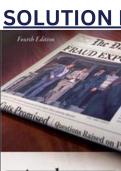Exam (elaborations)
Solutions Manual for Auditing and Accounting Cases 4th Edition by Jay Thibodeau & Deborah Freier
- Course
- Accounting
- Institution
- Ashford University Online
Solutions Manual for Auditing and Accounting Cases 4th Edition by Jay Thibodeau & Deborah Freier
[Show more]





